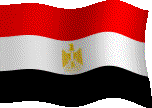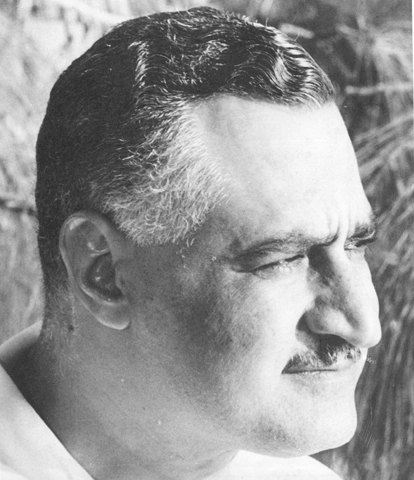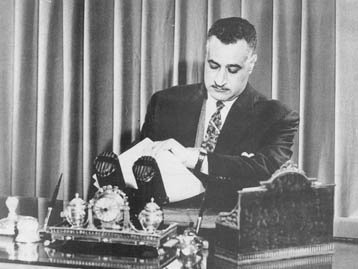


























|

|

|

|

|

|

|

|

|

|

|

|

|

|

|

|

|

|

|

|

|

|

|

|

|

|
|
|
|

|
|
|
GAMAL ABDEL NASSER |
|


|
|
|
Gamal Abdel Nasser was a pioneering figure in Egypt's struggle against colonialism and to this day, three decades after his death, remains a paramount symbol of Arab Nationalism. Much of the credit for the transformation of Egypt from a Royal system to a Republic also goes to him for the leadership role he played in the 1952 revolution as President of the Free Officers organization. Nasser transformed Egypt from a regular British colony to not only a major military power in Africa, but also a key player in Middle-East and World politics. Gamal Abdel Nasser was born on January 15th 1918 in an Egyptian town called Asyout. Due to his father's job postings, he would later move to Alexandria and then Cairo. He obtained his High School Diploma in 1937 from a school in Cairo, after which he enrolled at the Military Academy. He graduated from the Military Academy in 1938 and joined the 3rd Platoon in Asyout. It was here that he met Anwar El Saddat who would later become his major ally in the struggle for Egypt's liberation. Egypt at that time was a British colony. They had a King(King Farouk) who was deliberately equipped with a weak military by the British. The role of the Military was reduced to Palacial duties and basically policing British interests in the region. It was in the British interest that the Egyptian military be weak because they were afraid of military revolutions as had happened earlier in 1882 and 1919, one year after Nasser's birth. But this was not just a weak military; it was a very corrupt one too. It was against this backdrop that an organization of military men calling itself the Free Officers sprung up. The Free Officers were opposed to corruption in the military and demanded that it be strengthened to protect Egyptians and not British interests in the region. For fear of reprisals fro King Farouk and the British colonialists, the Free Officers operated underground at first. It was not until after the 1948 Arab-Israeli war(War of Palestine) that issues advocated by the Free Officers took centerstage. After the Israelis crushed the a united Arab army fighting for Palestine, the Arab public began demanding a strengthening of their military capability to match that of Israel. For Nasser, the demand was even more personal because during the famous Al Falouga battle in Palestine, he found himself engulfed by Israeli forces with no backup support whatsoever from his country's military. Eventhough his ill-equipped troops successfully resisted the Israeli onslaught at Al-Falouga making him an Arab military legend, the sabotage he encountered from his own country's military further strengthened his resolve to change the situation in Egypt. In 1949, one year after the war, the Free Officers organization went public and among its earliest officials included Gamal Abdel Nasser, Kamal El Deen Hassan, Hassan Ibrahim, Khaled Mohey El Deen and Abdul Menim Raouf. Later they added Gamal Salem, Abdul Hakeem Amer, Abdul Lateef Baghdady, Anwar El Saddat, Zakaria Mohey El Deen, Sarwat Okasha and Mansour Sideek. Most of these people were heroes of the 1948 war. When Nasser became President of the Free Officers organization in 1950, the stage was finally set for a showdown with King Farouk's administration. The much anticipated showdown came in 1952 during the Egyptian Revolution in which King Farouk was removed from power and forced into exile. In 1953, the Egyptian constitution was changed transforming Egypt from a Royal System into a Republic. Mohammed Nagueeb became the Republic of Egypt's first President in 1954 with Nasser as the Prime Minister. Nasser Later became Egypt's President in ****1956 and steered the country through a number of major achievements. Among the major achievements attributed to Nasser include the enactment of the Land Reform Law inorder to eliminate Feudalism and the construction of the High Dam in Aswan. Though already a folk hero in Egypt and the Arab world by the time he became Egyptian President, most Arab scholars will tell you that the one incident that catapulted Nasser into international recognition was the controversy surrounding the Suez Canal. Just being Egyptian President, Nasser was already turning major heads in Europe, particularly Britain, who saw him as an obstacle to their economic interests in the region. As a champion of Arab Nationalism, he was also a big threat to France who also had massive economic interests in its North African colonies. The French were particularly edgy about Nasser's close ties to Algerian radicals who were fighting to kick out the French colonialists. Israel was also in the midst of all this concern for its obvious national security reasons. Concerns about Nasser came to a head in 1956 when he dropped the ultimate bombshell by nationalizing the Suez Canal Company, effectively locking out foreign economic interests in the Canal. This move led to the infamous Tripartite Aggression against Egypt in 1956, where France, Britain and Israel mounted a combined attack on Egypt inorder to salvage their economic interests in the region and remove Nasser from power. The idea was to overwhelm Nasser militarily so as to encourage his enemies in Egypt to rise and topple him. This as we now know turned out to be a major miscalculation by the Tripartite Aggressors who the world viewed as nothing but a bunch of bullies attacking a helpless victim. This incident became a major public relations fiasco for France, Britain and Israel, who under pressure from US President Eisenhower and the United Nations, were forced to pull out of Egypt. Nasser, riding on his high Diplomatic success, followed this by Nationalising the remaining British interests in Egypt and expelling British nationals from the country. This is strikingly similar to how Fidel Castro of Cuba dealt with the Americans after his success at the Bay of Pigs. Nasser went on to become a major international figure and used his clout to highlight the plight of Arabs worldwide. He also became a key player in the Non-alligned Movement(NAM) which was a grouping of countries wishing to stay neutral during the Cold-War era. Gamal Abdel Nasser died on September 28th 1970, and to this day is still remembered as one of Africa's Greatest Warriors. | |
|
Return to the Home Page |
|
|
Copyright©AfricanTribute.com Inc., 2002 |
|
|
|

|
|
|
|